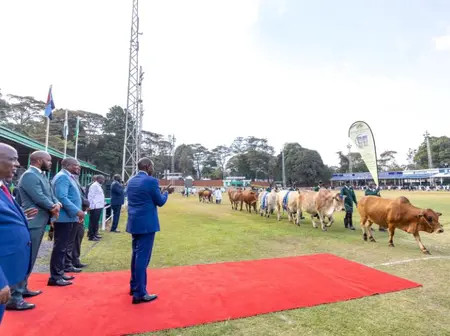President William Ruto has declared that Kenya must end the export of raw agricultural produce and instead channel massive investment into value addition and agro-processing.
Speaking on Wednesday at the official opening of the 2025 Nairobi International Trade Fair at Jamhuri Park Grounds, the President described agricultural manufacturing as the next frontier in transforming the country’s largest sector.
He emphasized that only by processing raw produce locally will farmers secure higher incomes, create more jobs, and drive stronger economic growth.
“For decades, we have exported our tea, our coffee, our livestock, our minerals, our cotton, our hides and skins, and even our fish in raw form only to import them back at a premium as finished products,” President Ruto noted.
He explained that this model has consistently denied farmers, workers, and entrepreneurs the full value of their labor and innovation, insisting that the era must come to an end.
Ruto outlined that through special economic zones, County Aggregation and Industrial Parks (CAIPs), and common user facilities, his government intends to add value to every product. This, he said, will create jobs, boost farmer incomes, and ensure more wealth is retained within the country.
“Value addition is not just an economic strategy; it is the key to prosperity for every stakeholder across the value chains,” he said.
The government is partnering with the private sector to set up common user facilities in Kericho, Nairobi, and Mombasa, with the goal of raising value-added tea exports from the current 5 percent to at least 50 percent in the medium term.
President William Ruto also announced that both the National Government and county administrations are constructing County Aggregation and Industrial Parks (CAIPs) in all 47 counties.
“These industrial parks are designed to serve as hubs where farmers take their produce, access cold storage, warehousing, and modern processing facilities, and connect directly to both local and export markets,” he said.
According to the President, this approach will eliminate post-harvest losses, cut out exploitative middlemen, lower logistics costs, and increase farmer earnings.
“Value addition alone, however, is not enough. Our farmers and producers must also access larger and more lucrative markets,” he noted.
To that end, Ruto highlighted that Kenya has signed trade agreements with major blocs and countries, including the African Continental Free Trade Area (1.4 billion people, GDP of $1.4 trillion), the European Union (450 million people), China (1.4 billion people), and the United Arab Emirates. He said these deals open bigger, more profitable markets for farmers and the private sector.
The President added that Kenya’s transformation is taking shape across multiple sectors – from affordable housing, tea, maize, coffee, and dairy to health and leather – stressing that cartels that had previously undermined these industries have already been dealt with.
At the same time, President William Ruto said his administration is reforming, supporting, and revitalizing agriculture and trade, describing the two as the “twin turbo-engines” of Kenya’s prosperity. He pledged that the government will make sure farmers’ hard work translates into real incomes and jobs.
“Over the past three years, we have registered 7.1 million farmers to deliver targeted support, reduced the cost of critical inputs, and invested in value addition,” he said.
The President expressed satisfaction with the reforms, noting that they are already cutting post-harvest losses, boosting productivity, and connecting farmers directly to competitive markets.
“This is the essence of the Bottom-Up Economic Transformation Agenda: Growth that is inclusive, sustainable, and transformative,” he said.
He added that the government plans to distribute 12.5 million more bags of fertilizer across all 1,450 wards during the 2026 seasons, on top of the 4.5 million bags already procured for the short rains.
“These interventions are paying off. Maize output rose to a record 67 million bags in 2024. This year, we project an even greater harvest of 70 million bags. Maize imports have dropped by nearly 70 per cent from 9.9 million bags in 2022 to 3.3 million in 2024,” he said.
On access to affordable credit, the President welcomed news that the Kenya Development Corporation had secured a Ksh.3.7 billion concessionary loan for KTDA farmers.
He explained that the funds will be used to modernize equipment in smallholder factories, lower production costs, and diversify into Orthodox teas to counter the global oversupply of Black Crush Tear Curl.

Leave a Reply